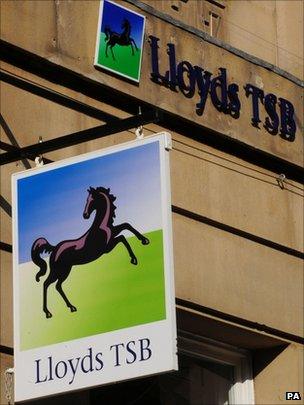Why Co-Op may be front runner for Lloyds’ branches
- Published
- comments

I may have under-estimated, by more than £1bn, the loss that Lloyds is likely to incur from the forced sale of branches, loans and deposits that collectively it has christened Verde (see Wednesday's post for more on this).
My probable error was to be too sanguine about the capital that regulators at the Financial Services Authority will force Lloyds to inject into Verde prior to the disposal.
I had been told that Verde's net equity capital would be around £2.5bn. So on that basis, NBNK's £1.5bn offer for Verde would - if successful (quite a big if) - crystallize a loss for Lloyds of £1bn (it would be paying £1.5bn for a business with a net value of £2.5bn; welcome to the wonderful world of banking in a period of endemic gloom among investors).
But here's the thing (as I am wont to say): the regulatory requirement for Verde to hold £2.5bn of capital, as a buffer against potential losses, would only be true if the new owner of Verde was a large, long-established bank (like Lloyds itself) which has what is known as advanced regulatory status.
But NBNK, as the new kid on the block, does not have advanced status and might not get it for years: it would have standard status.
With standard status, Verde would have to hold £3.6bn of capital - which, to repeat, would be capital initially provided by Lloyds.
So a bid of £1.5bn for Verde from an outfit with standard status would create a colossal loss for Lloyds of more than £2bn. Yikes.
Now of the three potential bidders for Lloyds, two - NBNK and Sun Capital - would find it hard to escape standard status, because (to state the obvious) neither of them have been giants in banking for the past 20 plus years.
That said, both have been talking to National Australia Bank about buying its UK operations, Yorkshire and Clydesdale banks - which have £3bn of capital - in an attempt to acquire more market share and credibility as potential owners of Verde's more than 300 branches and £36bn in deposits and liabilities.
But any takeover of NAB's UK banks, or any partnership with NAB, would not solve the regulatory status problem, because NAB does not have advanced status in the UK.
That said, there is one wannabe bidder for Verde with advanced status: Co-operative Banking Group, owner of the Co-operative Bank, Smile and Britannia.
In theory, a bid from the Co-Op would be worth about £1bn more to Lloyds than a bid from either NBNK or Sun Capital.
Which explains why bankers close to Lloyds have been making very positive noises about the Co-Op's chances of winning the auction for Verde, even though the Co-op is yet to make a bid.
There are a couple of caveats, however.
First, it's not that long since the Co-op bought the Britannia building society, and the FSA would have to be persuaded that the Britannia had been properly and safely integrated before giving the Co-op the green light to make a much bigger takeover.
Second, it's not immediately clear where the Co-op - as a co-op - will get the money for this every substantial deal.
So there remains a realistic possibility that Lloyds will not receive any realistic offers for the bank.
Nor does Lloyds' official fall back position, of floating Verde on the stock market, look particularly appealing, because stock-market valuations of banks are lower in relative terms than even what NBNK has offered for Verde.
Finally, there is another potential obstacle to any successful sale, which is that Lloyds has been told by one of the bidders, Sun Capital, that it has chronically underestimated the computer and systems costs of separating Verde.
As I understood it, Lloyds believes the systems costs would be of the order of £800m or £900m. whereas Sun - on the basis of extensive research - believes the bill for creating a new independent computer network to service Verde's 5m customers would be as great as £1.2bn.
The sheer size of these separation costs, if they become accepted, will further depress whatever bids Lloyds ultimately receives for Verde.
For Lloyds' board, what will be incredibly galling is that there is no scope for it to kill the sale and keep Verde: Lloyds will have to grin and bear whatever losses it eventually faces on a deal that has been ordered by Brussels.
Update 1740: I've received a bit more information on this fascinating and complicated auction.
First, NBNK is hopeful that the FSA - with possible encouragement from Lloyds - may award it advanced status, putting it on a level playing field with the Co-op in the bidding.
It is immensely difficult to know whether that optimism is misplaced - although I wouldn't expect NBNK's chief executive, Gary Hoffman, a lifelong banker (who reconstructed nationalised Northern Rock for the government) to be naive about this.
Second, NBNK is many hundreds of millions of pounds below Sun in its estimate of the cost of creating independent computer systems for Verde: NBNK believes the cost will be nearer Lloyds' calculation of £800m than Sun's estimate of £1.2bn.
All of this needs to be nailed down fairly fast, because NBNK won't be able to issue a prospectus to raise the money to buy Verde unless it has certainty on whether it will have advanced or standard status and also what the realistic IT and hardware expense will be.